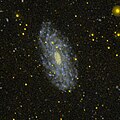NGC 2090
| NGC 2090 | |
|---|---|
 NGC 2090 captured by the Hubble Space Telescope in 2015. | |
| Observation data (J2000 epoch) | |
| Constellation | Columba |
| Right ascension | 05h 48m 22.3s[1] |
| Declination | −34° 13′ 37″[1] |
| Redshift | 0.003079[2] |
| Helio radial velocity | 921.5 km/s[2] |
| Distance | 40.1 ± 2.9 Mly (12.3 ± 0.9 Mpc)[1] |
| Apparent magnitude (V) | 11.20[3] |
| Apparent magnitude (B) | 11.99[3] |
| Characteristics | |
| Type | SA:(rs)c[3] |
| Apparent size (V) | 4.9′ × 2.4′[3] |
| Other designations | |
| MCG -06-13-009, PGC 17819[2] | |
NGC 2090 is a spiral galaxy located approximately 40 million light-years from the Solar System[1] in the Columba constellation. It was discovered on 29 October 1826 by Scottish astronomer James Dunlop.[4] NGC 2090 was studied to refine the Hubble constant to an accuracy within ±10%.[1]
See also[]
Gallery[]
References[]
- ^ a b c d e Phelps, Randy L.; Sakai, Shoko; Freedman, Wendy L.; Madore, Barry F.; Saha, Abhijit; Stetson, Peter B.; Kennicutt, Robert C.; Mould, Jeremy R.; Ferrarese, Laura; Ford, Holland C.; Gibson, Brad K.; Graham, John A.; Han, Mingsheng; Hoessel, John G.; Huchra, John P.; Hughes, Shaun M.; Illingworth, Garth D.; Silbermann, N. A. (1998). "The Hubble Space Telescope Extragalactic Distance Scale Key Project. IX. The Discovery of Cepheids in NGC 2090". The Astrophysical Journal. 500 (2): 763–788. Bibcode:1998ApJ...500..763P. doi:10.1086/305766.
- ^ a b c "NGC 2090". SIMBAD. Centre de données astronomiques de Strasbourg. Retrieved 2021-02-25.
- ^ a b c d Gil de Paz, Armando; et al. (December 2007). "The GALEX Ultraviolet Atlas of Nearby Galaxies". The Astrophysical Journal Supplement Series. 173 (2): 185–255. arXiv:astro-ph/0606440. Bibcode:2007ApJS..173..185G. doi:10.1086/516636. S2CID 119085482.
- ^ "New General Catalog Objects: NGC 2050 - 2099". cseligman.com. Retrieved 2017-12-14.
External links[]
| Wikimedia Commons has media related to NGC 2090. |
- NGC 2090 on WikiSky: DSS2, SDSS, GALEX, IRAS, Hydrogen α, X-Ray, Astrophoto, Sky Map, Articles and images
- SEDS
Coordinates: ![]() 05h 48m 22.3s, −34° 13′ 37″
05h 48m 22.3s, −34° 13′ 37″
Categories:
- NGC objects
- Columba (constellation)
- Unbarred spiral galaxies
- Discoveries by James Dunlop
- Principal Galaxies Catalogue objects
- Spiral galaxy stubs

